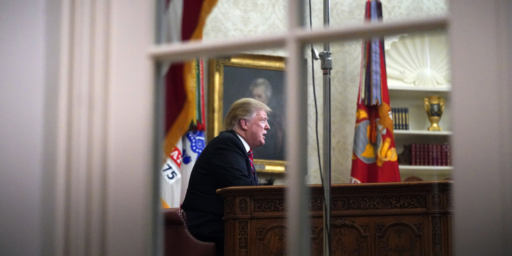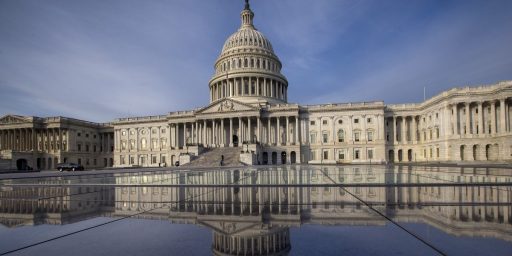Congress Reaches Budget Deal, Delays Immigration Fight For Another Day
It looks like Congress has averted a budget fight for the second straight year.
With the current Continuing Resolution set to expire at midnight on Thursday, it looks as though Congress has reached a budget deal, although as expected its a deal that will put off a future fight over immigration in general, and President Obama’s executive action in particular, off until shortly after the 114th Congress takes office:
Congressional leaders unveiled a massive $1.01 trillion spending bill Tuesday night that will keep most of the federal government funded through September.
The legislation is expected to pass in the coming days and will allow the incoming Republican-controlled Congress to clear the decks of lingering spending issues while setting the stage for a prolonged fight with President Obama over immigration policy.
At 1,603 pages, the bill includes at least $1.2 billion for agencies to deal with the influx of unaccompanied immigrant children who crossed the U.S.-Mexico border. There’s also money to fight the rise of the Islamic State and $5.4 billion to fight the threat of Ebola. But there are also significant changes to campaign finance laws and potential cuts to retiree pension plans. Democrats were cheering bigger budgets for enforcement at agencies created after the 2008 economic collapse.
House leaders are planning to introduce a stopgap bill to give the House and Senate a few more days to pass the final measure and avoid a government shutdown Thursday night. Extending current funding for a short period has happened before, but doing so this year will provide an embarrassing climax to one of the most fruitless congressional sessions in history.
“There’s no reason the government should shut down,” said Senate Majority Leader Harry M. Reid (D-Nev.). “And we’re ready to pass a year-long spending bill to take care of this.”
John Thune (S.D.), the third-ranking Republican senator, joked that last-minute drama with the spending plan “is a Christmas tradition.” But, he added, “I don’t see it getting derailed. I think it could get slowed down, but I think it will ultimately get across the finish line.”
The White House had not indicated by late Tuesday whether it supported the bill.
The agreement hews to spending caps that lawmakers and the White House agreed to last year. It includes $521 billion in military spending and $492 billion for other federal agencies. An additional $64 billion would be set aside for overseas military operations, including the fight against the Islamic State and to assist European countries facing Russian aggression.
The legislation would provide full funding for 11 of the 12 appropriations bills Congress is supposed to pass each year. But Republicans insisted on a shorter funding schedule for the Department of Homeland Security, which has jurisdiction over immigration enforcement. The sprawling department will get money only through February, giving Republicans more time to craft a legislative response to Obama’s decision to use his executive authority to change immigration policy.
But federal dollars also would be spread to other agencies to help address the rise in immigration, which is likely to infuriate conservative lawmakers seeking to cut funding for immigration programs.
The Department of Health and Human Services would receive $948 million to provide health and education services to the unaccompanied children — an $80 million increase. An additional $14 million would be provided to help school districts dealing with an influx of immigrant students. And the State Department would receive $260 million to aid the Central American countries where most of the young migrants are coming from.
Sen. Barbara A. Mikulski (D-Md.) and Rep. Harold Rogers (R-Ky.), who led the talks as leaders of the Senate and House appropriations committees, called the bill a fair deal.
“While not everyone got everything they wanted, such compromises must be made in a divided government,” they said in a statement.
While some conservatives such as Ted Cruz and Erick Erickson seem to want to see the right fight this new deal and, if necessary, bring about a shutdown over the President’s immigration policy changes, it appears that there will be more than enough support to get this package through both the House and the Senate, although it will likely require a short term extension of a day or two to allow sufficient time for the matter to get through the Senate since Cruz and others are likely to seek to deny the unanimous consent necessary to get through the Senate without the debate period required by standing rules. That will just be a temporary bump in the road, though. Since the election, the Republican leadership in the House and Senate have both made clear that they were not interested in a shutdown or any other kind of showdown with the President during the lame duck period. This continued to be the case even after the President went forward with his plans to undertake so-called “executive action” before Thanksgiving, and that’s when leadership came up with the present plan. Assuming this measure passes, then the vast majority of the government will be fully funded all the way through the end of the fiscal year in September 2015. The one exception will be the Department of Homeland Security, which is where the relevant immigration services are located now, which will be funded through March and, of course, will be subject to further debate at that point when Republicans have a larger majority in the House and control of the Senate for the first time in a decade. Once we get to March, of course, there likely be calls for yet another showdown over the immigration issue, but at the very least it will not result in a full government shutdown of any kind thanks to the fact that most of the government will be fully funded.
It’s not surprising that people like Cruz and Erickson would oppose a deal like this, of course. Funding most of the government through the end of the Fiscal Year means that they, along with other opponents of the President’s so-called “executive amnesty” will have far less leverage than they would have if there were a showdown now. At most, the only thing such a showdown would accomplish would be to impact the budget of the Department of Homeland Security, and even there the impact would likely be minimal since a large part of what DHS does is considered the type of “essential” service that would continue regardless of whether or not there was a funding deal in place. Moreover, as I have noted before, the department that will be designated to handle the applications for the deferred deportation status that the President’s policy creates is self-funding and therefore would be unaffected by any shutdown. In the end, then, it appears that what the House and Senate leadership has done here is guarantee that the opponents of the President’s policy changes will have an opportunity to protest those actions when March rolls around, but those protests will have little practical impact on the operation of government and little chance of actually being able to impact policy itself. If it works, it’s actually some pretty skillful maneuvering on the part of Boehner, McConnell, and the rest of the leadership. It’s a plan that will let the Tea Party blow off some steam while guaranteeing that they don’t have an adverse impact on the agenda that the leadership wants to pursue. If it works, it could mean that they’ve finally figured out how to tame the Tea Party monster.






Where do I sign up to get a job where I can unilaterally extend my hard project deadlines when I find them inconvenient?
If Cruz was a real conservative, he would deny unanimous consent for the short term extension.
@Gustopher:
I guess we will find out soon enough.